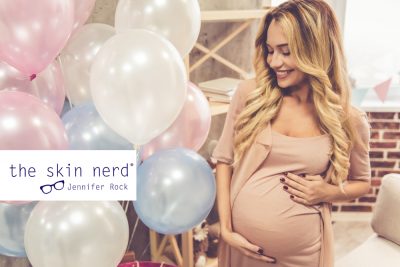
Pregnancy-Safe Skincare: Sunscreen, Fake Tan & Skin Treatments
I’ve spoken about skincare in pregnancy before but you really can’t have enough info about it… New studies are carried out all the time, opinions change and I just think of things that I perhaps didn’t mention before.
This time around, I’m covering why pregnancy gives some people wondrous, glowy skin, whether sunscreens are pregnancy-safe, wearing fake tan whilst pregnant and skin treatments to avoid while pregnant.
Growing a tiny hooman inside you is gruelling work sometimes. Swollen feet, vomiting, varicose veins and all the rest are not easy things to deal with. There is one perk: pregnancy glow. At a certain point in your pregnancy, some notice that their skin has taken on a new lease of life.
It’s radiant and wonderful and, though you may be suffering from some pregnancy-related acne, you look years younger. Some get it and some don’t – why is that?! Life is just unfair.
The cause of pregnancy "glow"
The “glow” isn’t caused by one factor, it’s caused by a number of them. In pregnancy, you have increased levels of oestrogen and progesterone, two female sex hormones. At the same time, you have nearly twice as much blood during pregnancy as you do when you’re not pregnant. Do you ever need that little reminder of how phenomenal the hooman body is? That’s it.
More blood = more blood flow so whilst your blood is rushing to give your in-uterine mini as many nutrients as possible, it’s consequentially feeding them to your skin too. Obviously, the nutrients being delivered have to be in your system first - get hoofing that broccoli into you.
It’s the same reason that facial massage, electrical muscle stimulation (EMS, the devices that work to tighten muscles) and oxygen facials give you such a glow too – they also improve blood circulation. Although the increased oestrogen makes you radiant, it also makes your melanocytes more active. In non-nerdie speak, melanocytes are the skin cells that create pigment (colour) in the skin.
This is why pigmentation is so commonly associated with pregnancy.
Pregnancy-safe skincare: sunscreen, fake tan, vitamin A and skin treatments
When you’re pregnant, all that you want is what is best for your baby and in this, you don’t want to be putting anything on to you that will affect them. There is a lot of confusion out there about what is okay to use during pregnancy and what isn’t. In the end, it is your decision but I wanted to clear up some myths I’ve come across with regard to skincare and pregnancy.
Are sunscreens pregnancy-safe?
From my knowledge, the knowledge I’ve accrued in training with all of the brands I’ve worked with over the years and my own research, sunscreen filters, whether chemical or physical, are pregnancy safe. They cannot penetrate into your blood stream - your skin’s job is to stop things from doing this and topical skincare products can’t reach your dermis directly, let alone get into your bloodstream. The main sunscreen filter that is sometimes believed not safe during pregnancy (or unsafe in general) is oxybenzone.
Oxybenzone is a chemical filter in which there are plenty of studies on, a very particular one of which states that women exposed to oxybenzone during pregnancy had female babies with lower birth weights. Often, when this study is mentioned, it’s not mentioned that the study noted only correlation and that oxybenzone exposure also correlated to higher birth weights in male babies. Take from that what you will.

If you are at all worried about chemical sunscreens during pregnancy, opt for a sunscreen that uses mineral filters alone, if only for peace of mind. Many women experience newfound skin sensitivities during pregnancy too so it ain’t a bad switch to make if this is you.
Murad City Skin Age Defense Broad Spectrum SPF 50 (€59.50) is much beloved by members of the Nerd Network (ie. our clients), has a matte-velvet finish and additionally protects from HEV light. A more affordable mineral sunscreen option is Avène’s Tinted Mineral Fluid SPF 50+ (€21.00) - there is a non-tinted version but I personally prefer the tint. It’s especially important to wear sunscreen during pregnancy due to the likelihood of pigmentation occurring too!
Topical vitamin A (retinol/retinyl palmitate) during pregnancy
Retinol is one to avoid during pregnancy as it hasn't been tested on the skin of pregnant hoomans. However, retinyl palmitate, such as in Environ’s Skin EssentiA AVST Moisturiser (€49.95), is deemed okay in lower doses. In the last year, Environ have even stated that AVST Moisturiser 1 and AVST Moisturiser 2 are suitable for use during pregnancy. WEHOOO! Want to get a pregnancy-safe vitamin A serum onto your skin and find out why it’s our all-time favourite skingredient?
Wearing fake tan whilst pregnant
When it comes to fake tan when you’re pregnant, it’s commonly recommended that you avoid having a spray tan. DHA, or dihydroxyacetone, is the active ingredient in fake tan and although it is safe when applied topically, there are concerns that breathing in DHA may be harmful (for all, not just for those who are pregnant). Seeing as skin can be more sensitive whilst pregnant, go for a fake tan that doesn’t contain boatloads of irritants such as TanOrganic.
They have a few different formulations including their Self Tan Lotion (€19.99), Self Tan Oil (€24.99) and their Self Tan Mousse (€29.99) and they are very skin-friendly compared to most other fake tans. If you can barely see over zee bump, opt for the mousse as it has a colour guide (ie. it is a dark brown so you can see where it is going) – make self-tanning whilst pregnant a teeny weeny bit easier. If you are self-tanning whilst pregnant but are planning on breast-feeding, avoid your nipples. Imagine if someone poured fake tan all over your dinner… You wouldn’t be too delighted!
Botox and fillers during pregnancy
It’s not recommended that you have botox injections during pregnancy as it is a toxin that you are injecting into your muscles so it’s getting a lot deeper than topical skincare. The same goes for fillers. As this type of injectable stays in the body for sometimes upwards of 6 months, it’s usually advised to take a break from them if you’re planning pregnancy too.
Skin treatments during pregnancy
Treatments during pregnancy is a bit of a trickier topic. Some of the facials that you adore may be out the window for those 9 months, give or take. Things that use electrical currents are a no-go so that’s EMS out the window as well as things using iontophoresis or sonophoresis. The same goes for peels as such a high amount of acids could over-stimulate your already changing skin.

The good news is that LED light therapies are considered fine to be used on the face during pregnancy (just not near the abdomen). Why is this such good news? Well, if you suffer from severe acne, it’s likely that you may have to stop using some prescription acne medications when you fall pregnant. LED therapy (especially blue and red LED) can be super beneficial for killing acne bacteria and bringing down inflammation in the skin – all without any ingredients at all.
Make sure to always get advice from your GP or medical advisor (and from your skin therapist) but remember that what’s most important is what you’re comfortable with. Are you suffering from sensitivity, dryness, dehydrated skin, pigmentation, acne or anything else during pregnancy? We stock lots of pregnancy-safe products on our online store and our Nerdettes are more than happy to advise you on what you can use!
More info on skincare during pregnancy:
